Medical Weight Loss Practice Marketing – Typical Pricing $999/mon to $1999/mon
Used By the Top Medical Weight Loss Practices in USA & Canada. Key Steps You Can Take To Improve Your Business. Typical Pricing $999/mon to $1999/mon for complete service.

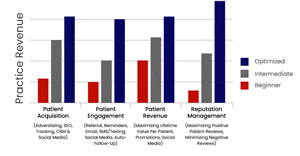
Examples of Weight Loss Companies
There are typically 9 type of medical weight loss approaches/practices: Medical weight loss methods are professionally supervised approaches designed to help individuals lose weight safely and effectively, often tailored to their unique health needs. These methods combine medical expertise, lifestyle modification, nutrition, and more recently medication or procedures to achieve sustainable weight loss.
1. Prescription Weight Loss Medications
- Medications prescribed by a healthcare provider to help reduce appetite, increase feelings of fullness, or decrease fat absorption.
- Examples: GLP-1 receptor agonists (e.g., Semaglutide, Liraglutide), Orlistat, Phentermine.
2. Medical Nutrition Therapy
- Personalized dietary plans created by registered dietitians or physicians focusing on calorie control, nutrient balance, and behavioral changes.
- May include meal replacements or medically supervised fasting protocols.
3. Behavioral Therapy and Counseling
- Psychological support to address eating behaviors, emotional triggers, and motivation.
- Techniques include cognitive-behavioral therapy (CBT), support groups, and coaching.
4. Physical Activity Programs
- Customized exercise plans designed to complement dietary changes and improve metabolism and overall health.
5. Medical Monitoring and Lab Testing
- Regular health assessments including blood work, body composition analysis, and vital signs to safely guide weight loss and adjust treatment.
6. Bariatric Procedures
- Minimally invasive surgical or endoscopic interventions for significant weight loss in eligible patients.
- Examples: Gastric bypass, sleeve gastrectomy, gastric balloon.
7. Hormonal and Metabolic Evaluation
- Assessing and treating hormonal imbalances (thyroid, insulin resistance) that may affect weight.
8. Nutritional Supplementation
- Use of vitamins, minerals, or amino acids to support metabolism and overall health during weight loss.
9. Integrative approach typically combines conventional medical strategies (like metabolic assessments and medication management) with therapies such as nutrition counseling, lifestyle modifications, stress management, and behavioral support, focusing on the patient’s overall health and well-being.
If you have a weight loss practice, but would like to increase the patient count at your business? You need to engage in weight loss clinic marketing at your practice. At PatientGain.com, we’ve helped hundreds of practices with their websites, social media marketing, repeat client marketing, digital advertising for medical weight loss and overall increasing the number of patients they see at their weight loss clinic. There are some key steps you can take at your clinic to improve your business. Using realistic pictures of people creates higher conversions. See the example below.


1. Optimized Medical Weight Loss Website
Your website needs to be user-friendly, informative, load quickly, and automatically be formatted to any screen it is viewed on. Users should have the same experience on desktop, mobile, or tablet devices. Separate websites for separate devices are cumbersome and inefficient. Present content that is useful and informative to your weight loss patients to educate them on the services you offer. This will generate better quality leads for your practice and improve your overall search rankings.
A “website conversion success rate” refers to the percentage of potential patients who successfully convert into actual patients after interacting with a healthcare provider’s marketing efforts, usually measured through the effectiveness of their website or online presence, essentially indicating how well they are able to attract and acquire new patients through their marketing strategies.
Key points about website conversion success rate:
- Measured by conversion rate: This rate is typically calculated by dividing the number of new patients acquired through marketing efforts by the total number of people who interacted with the marketing materials (like website visits, new patient calls, texting apps, or form submissions).
- Importance of website design:A well-designed and user-friendly healthcare website is crucial for a high website conversion success rate, as it should clearly present information, facilitate appointment booking, and encourage engagement.
- Factors influencing success rate:
- Search Engine Optimization (SEO): How well the website ranks in search engine results.
- Call-to-action effectiveness: Clear and compelling prompts for users to take action, like scheduling an appointment.
- Lead generation apps: Well-designed forms to capture patient information.
- Patient reviews and testimonials: Social proof can significantly influence conversion rates.
Example: If a healthcare practice receives 100 website visits and converts 5 of those visitors into new leads, their website conversion success would be 5%. See example below: In the month of August, 2027 human being prospects visited the website, from SEO, Google Ads and Social Media Ads. 294 of these prospect clients contacted the practice and indicated that they were “new patients” rather than existing patients. So in this case website conversion success rate is 14.5 Percentage.
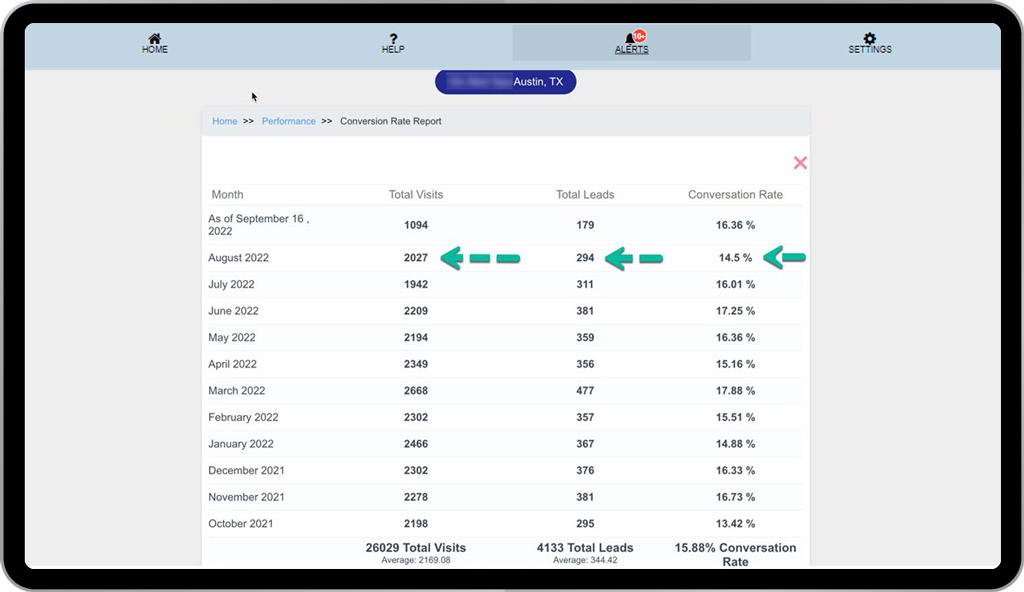
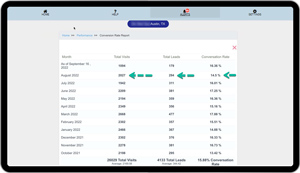
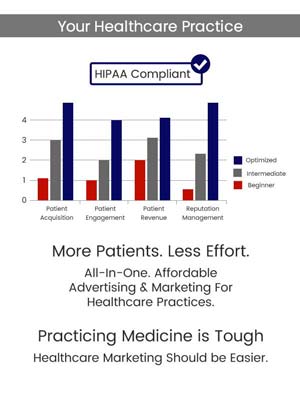
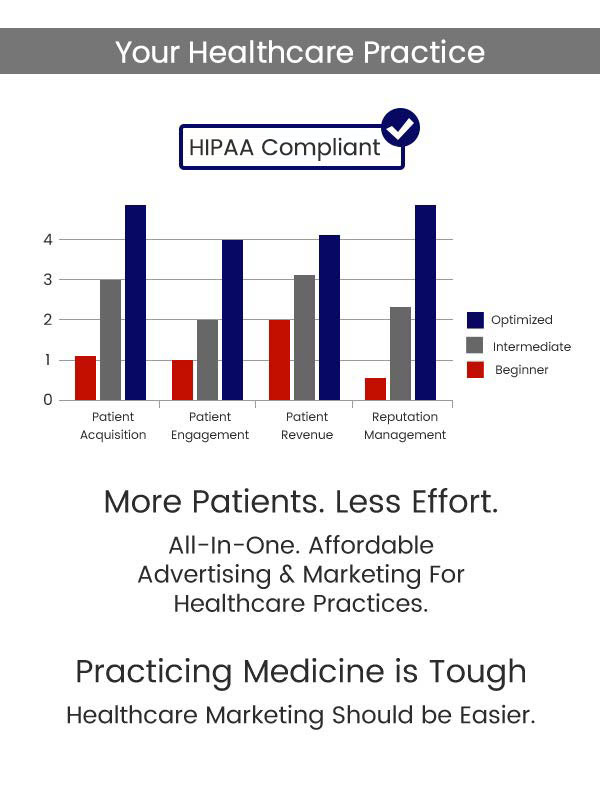
2. Claim online profiles
Create or claim your business profiles on these critical websites: Google, Yelp, Bing, and Foursquare. These directories provide business data to the vast majority of mapping services and other online apps. Incorrect or missing information can make it harder for patients to find your clinic and hurts your overall search rankings. Ensure the following is up to date:
- Name of your clinic
- Hours of operation
- Address
- Phone Number
- Services
- The location indicated on a map
- Photos of your clinic
These profiles are also where you will receive and manage your online reviews.
3. Paid online advertising (Google, Facebook, Instagram)
The organic reach of your weight loss clinic may need some additional support to reach your target audience. Paid ads allow you to reach people who use search terms that you may not currently rank well for, at least not yet. Your online ads will appear above organic search results and a map of nearby businesses. These are your first chances to get in front of eyes that may need your services. Even if you do rank well for a search term organically, it may be in your benefit to appear three times to a potential patient: Paid results, map results, and organic results. If your business appears these three times to a prospective patient, it is a powerful visual cue that your weight loss clinic is ready to help.
Example 1: Weight loss paid ad on social media: Promoting Tirzepatide injections – FDA approved for weight loss.
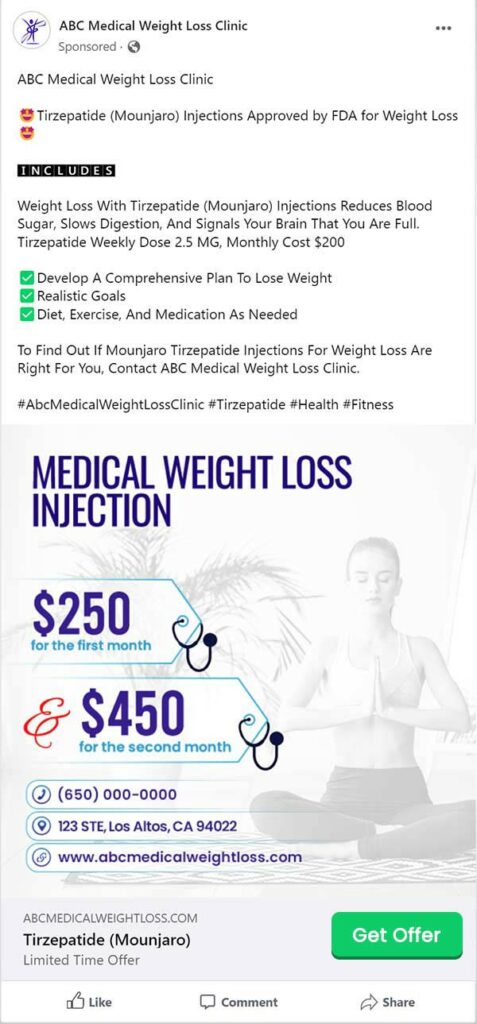

Example 2: Video weight loss paid ad on social media: Promoting flexible programs, for a medical wight loss practice in Florida.
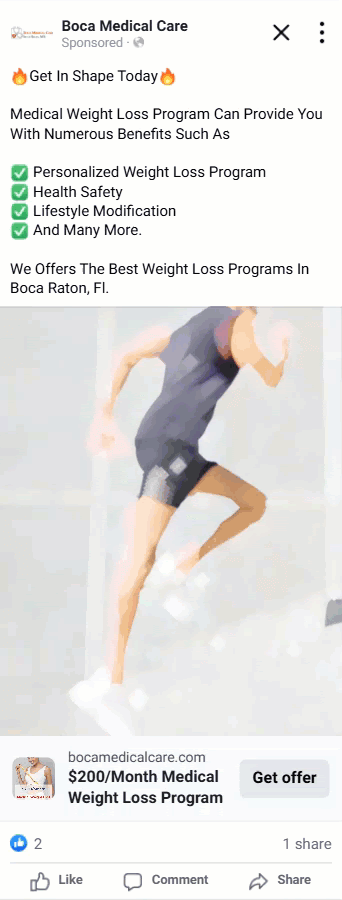
4. Patient engagement Via social media
Social media is a great way to connect with your current patients and reach potentially new ones. You should create and fill out social media profiles and update them with content, news, promotions, and updates from your weight loss clinic. Achieve a balance between posts that talk about your services and news that may interest your clients. While you do not need to have a presence on all of these social media profiles, some of the most popular channels, including Facebook, Twitter, and Instagram. Some weight loss clinics have found Snapchat, Tic Tok, and Pinterest to be useful as well.
What PatientGain.com can do for your weight loss clinic using PLATINUM service:
22 key features of PLATINUM services for your medical weight loss practice:
1. Local SEO Optimization
There are over 200 directories for medical practices. Most of them have no to marginal impact on your practice. The most important business listings are 1. Google Business Page 2. Facebook Business Page 3. Yelp Business Page. 4. Apple maps, and few other healthcare specific directories are also important.
2. Organic SEO Optimization
Our experts will identify the top keywords that need to be integrated into your site to improve your search ranking. Achieving top Medical SEO rankings for medical practices and physicians is a process and not a simple one-time setup. It is time-intensive, requires deep knowledge about your own medical practice, your services and Search Engine technology, costs both money and time to get real results, and it never stops for your medical practice. Your Target Audience Is Search Engines and Potential Patients – They Are Both Equally Important.
3. Online Advertising
Instead of logging into multiple places to monitor your ads on search and social media, we can manage, monitor, and display your marketing campaigns in one place. Our data shows that proper advertising produces more patients for 99 percentage of the clinics/doctors. However setting up and managing Google, Facebook, Instagram ads is not a simple task. Just one or two mistakes can waste your budget. Our data shows that over 73% of the campaigns have issues, they have incorrect settings, wrong targeting, not enough branded images (for display based campaigns), or improper negative keywords or no negative keywords. List goes on and on. We have seen disasters, but we have also seen good campaigns. In summary, online advertising for doctors, works – question is how efficient is the campaign? and is it optimized?
4. Content Posting on Social Media
On brand, engaging social media posts can be created and posted from a single dashboard without paying for a multi-channel posting service.
Social media is here to stay, and as a doctor, you need to take advantage of this powerful marketing tool to engage with current and potential patients. One of the most popular social media channels out there today is Facebook, Instagram and Google Posts. While Instagram owned by Facebook, in many respects, it is a different entity altogether from Facebook with different rules and capabilities. Your local competitors are using Instagram, so should you.
5. Reputation Management
Your online reputation is key to the success of your weight loss clinic. Our system can help you manage your reputation, pushing for positive reviews, and capturing negative feedback before it is posted publicly. Online Reputation Management Can be a Headache or a Winning Strategy for Doctors & Healthcare Clinics. Only 28 Percent of the Time it is Patient-Physician Related. 72% Of the patients who are unhappy and who post negative feedback on Google and Yelp are not doing so because of the Patient-Physician experience; they are unhappy due to billing issues, incorrect deductible payment, rude front desk person, lack of perceived patient focus, improper handling of the paperwork, long wait time or impolite response from a clinic staff member ( non-physician ). 28% of the time it is Patient-Physician related.
6. Showcase Reviews
Show potential clients to your weight loss clinic the great reviews you’ve already received. Update them regularly and with ease from your dashboard. Simple App Collects Reviews From The Web. You Decide Which Ones To Display. Included in GOLD PLUS Package. 73% Of The Patients Look at Your Practice’s Reviews or Your Service Reviews. Highlight Your POSITIVE Reviews and Minimize Negative Reviews. As you build a roster of Positive Reviews on the most important sites, like Google, Facebook and Yelp, now take your strategy to the next level. Select the best reviews, add them to your awesome medical marketing website, and increase your conversion.
7. Medical Lead Management Funnel App
PatientGain’s Leads funnel app provide complete all in one solution to manage your prospect client and patient’s data from one single place. With advanced features like leads category, ability to assign leads to different users and much more, leads funnel app makes it easier for users to keep track of the new incoming leads and also the past leads. Easily text and Email them. Send a payment link, and more.
8. Email Marketing
PatientGain.com’s user-friendly email marketing is done for you every month. It allows you to easily keep your patients up to date with the latest news and specials. Email Marketing is a vital for clinics and doctors, as it helps you promote your healthcare brand, engage with your patients, and even re-activate past patients. To run effective campaigns, your clinic needs to have a clean data, and a targeted list of patients that you’re marketing to. It is important to make sure that your Email Marketing is Mobile Optimized. You also need to make sure that you understand your patient’s behavior. Every medical practice should send Email campaigns 2 times a month. In certain cases, 3 times a month. The Emails should be optimized for mobile layout, which is single column layout.
9. Custom Image Creation
Our experts can create custom images and content for your website, social media posts, and even monthly email marketing blasts to send to your clients. 8 Reasons Why Content Is Important. Your Content Is the Single Most Important Factor in Your Online Success.
1. Content defines your brand.
2. Content expresses who you are, how you conduct your business.
3. Content is read by the Search Engines – and this results in GOOD or POOR rankings – You should NEVER copy content from another site. Checking ideas from other websites is OK, but copying content is like shooting yourself in the foot.
4. Content can make your marketing flourish.
5. Content can make your advertising irresistible.
6. Social media loves GOOD content.
7. Email marketing with good quality content will give you higher open-rates.
8. Best of all – Patients LOVE Useful content.
10. SMS/Text Alerts
Don’t be glued to your seat continually refreshing a dashboard or checking your mail. We can set up text alerts to send to you or your center administrator when crucial alerts come in. Effective patient communication means that you get alerts from your online campaigns and your medical marketing website on a timely basis. SMS Text based messages alert you or your practice manager in near-real-time as you get new patient requests and leads. Stay on top of new patient requests. Easy to see results. Setup is done for you by your dedicated Customer Success Manger.
11. Promotions
Promotions and specials are made accessible from our dashboard, and we can capture patient data for future marketing purposes. 5 key strategies for promotions.
- Offer promotions on your website
- Offer promotions to your Facebook Business page.
- Post your promotions on Facebook
- Post your promotions on Google Posts
- Offer promotions to your monthly newsletter.
Remember the secret of adding promotions is NOT TO DISCOUNT your services, but cause patients to “click” and offer them something useful of value. For example a promotion that offers $5 donated to your local school for every new patient’s physical performed at your local Urgent Care is an awesome promotion and causes an excellent conversion.
12. Patient Medical Forms
Save your patient’s and staff’s time with secure, online forms that can be filled out ahead of time. They can then be printed out or securely submitted to your clinic.
13. Intelligent Auto Responders
You may have a frequently asked question section, but are you still getting the same questions every day? We can set up an intelligent autoresponder that will answer your patient’s questions so your staff can focus on those with more complex needs.
14. Referrals
We make referrals from other doctors easy! They can securely submit information through your website instead of leaving a message or sending an email that may get lost amongst other messages.
15. Call Tracking
Track the calls coming into your clinic and see how long conversations are taking with your staff. We can even set up multi-number tracking if you have different phone numbers for various campaigns.
16. Online Appointments
Allow patients to take charge of their health by allowing them to make their own appointments. These appointments will appear on your dashboard and seamlessly integrate into your ERM.
17. Online Payments
Save yourself a trip to the bank to cash checks and allow patients to pay their bills online.
18. HIPAA Compliant CRM
Our customer relationship management system is entirely HIPAA Compliant.
19. Patient Feedback Forms
How are your doctors and staff doing? Our patient feedback forms are available to maintain the quality of your clinic.
20. Multi-Level User Control & Access
Not everyone who works for you needs complete access to your dashboard. Create multiple logins with different levels of access with ease.
21. SMS/Texting App for 2 Way Communication
Secure, HIPAA Compliant, chatting with your patients is available to you.
22. Industry Leading Support
Have you run into an issue? Is something not working like you think it should? Have you forgotten how to operate a part of the dashboard? Contact our industry-leading support staff, and we can quickly assist you in getting back on track.
Contact PatientGain.com today and let us show you how we can make your Weight Loss Clinic Marketing even better than it is today!

